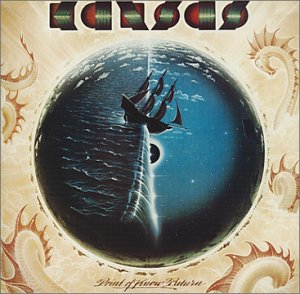- Point of Know Return
Infobox Album |
Name = Point of Know Return
Type =Album
Artist = Kansas

Released = September 1977
Recorded = June-July 1977 at Woodland Sound,Nashville, TN and
Studio In The Country,Bogalusa, LA
Genre =Progressive rock
Length = 43:59
Label = Kirshner
Producer = Jeff Glixman
Reviews =
*Allmusic Rating|4|5 [http://www.allmusic.com/cg/amg.dll?p=amg&sql=10:rh9ss30ba3zg~T1 link]
*"Rolling Stone " (mixed) [http://www.rollingstone.com/artists/kansas/albums/album/259687/review/6210463/point_of_know_return link]
Last album = "Leftoverture "
(1976)
This album = "Point of Know Return"
(1977)
Next album = "Two for the Show "
(1978)"Point of Know Return" is the fifth
album by American rock band Kansas, released in 1977 (see1977 in music ).The huge success of Kansas's previous effort, "
Leftoverture ", brought a new kind of pressure. While they were no longer desperately poor and starving for a hit, the band wondered whether they'd be able build on, or at least maintain the level of achievement the years of recording and touring had brought them. The sessions for their follow-up LP, "Point of Know Return", were filled with tension as singer/songwriter Steve Walsh, who had always been uncomfortable with the artistic direction of the band, left the group briefly. Years later, Walsh would admit in an interview with nationally-syndicated radio host Redbeard on the weekly rockumentary series "In the Studio with Redbeard " (edition #849, week of 9/27/04 and again on the 30th Anniversary Episode for Point of Know return in 2007) that he had been something of aprima donna at this point. The other members of the group talked him into returning and the sessions continued. As with the previous album, it was a last-minute addition to the track line-up that would prove to be a huge success.Kerry Livgren had been practicing with his acoustic guitar, working on a chord progression that he had written as a finger exercise. His wife, Vicci, happened to hear what he was doing and remarked that the melody was nice and that he should write lyrics for it. The result was a short song called "Dust in the Wind ". Again, Livgren was unsure as to whether his fellow band members would like it, since Kansas was not known for acoustic ballads. Needless to say, the song was recorded, securing Kansas's place in the annals ofclassic rock .A Detailed Description
"Point of Know Return" begins with a song of the same title, clocking in at 3:12. It was a later addition to the album, along with giving the album its name. After this track is "Paradox", in which the violin takes center stage as a solo instrument in an extension of the prototypical Kansas style. Following is the disjointed instrumental "The Spider", composed by Steve Walsh and so named for its alleged likeness to the arachnid. This piece segues into an Albert Einstein, "Portrait (He Knew)". "Portrait" is a straightforward collection of rock riffs and somewhat strained phrases, building upon a relentless theme and weaving a unique patchwork of counterpoint. "Closet Chronicles" is a Howard Hughes allegory, which is an unusual subject for a progressive rock epic. Nonetheless, this song includes a unique instrumental break and makes use of the contrasting vocal timbres of Steve Walsh and Robby Steinhardt. Next is a somewhat dated generic rock tune called "Lightning's Hand." In this song, Steinhardt attempts vocal caricatures similar to
Peter Gabriel andPhil Collins in their respective tenures in the British progressive rock group Genesis. Following this song is the work in which many listeners judge the band, "Dust in the Wind". The song in no way reflects any other song in the entire Kansas canon, particularly because of its sparse acoustic nature. In this song the band explores the prospect of death and the insignificance of one lifetime in the endless thread of time. "Sparks Of The Tempest" comments upon the cyclical nature of rebellion and the claim of power through a purely Kansas-esque brand of accessible rock. "Nobody's Home" chronicles an alien encounter with the world of a fallen civilization, and reflects the pensive atmosphere of "Dust." This song makes effective use of Robby Steinhardt's skill on the violin, particularly in the climax of the instrumental break. The album closes with "Hopelessly Human", a progressive epic in the vein of those on "Leftoverture". The piece features many instrumental solos.Analysis and Conclusion
Point of Know Return would be Kansas' highest charting album in the US peaking at #4 in January of 1978 and would duplicate the sales tally of its predecessor (1976's "
Leftoverture ") by selling four million copies in the US and certified Quadruple Platinum by the RIAA.Cultural impact
Track listing
#"Point of Know Return" (Ehart, Steinhardt, Walsh) – 3:13
#"Paradox" (Livgren, Walsh) – 3:50
#"The Spider" (Walsh) – 2:03
#"Portrait (He Knew)" (Livgren, Walsh) – 4:38
#"Closet Chronicles" (Livgren, Walsh) – 6:32
#"Lightning's Hand" (Livgren, Walsh) – 4:24
#"Dust in the Wind " (Livgren) – 3:28
#"Sparks of the Tempest" (Livgren, Walsh) – 4:18
#"Nobody's Home" (Livgren, Walsh) – 4:40
#"Hopelessly Human" (Livgren) – 7:09
#"Sparks of the Tempest*" [Live 1978] (Livgren, Walsh) – 5:17
#"Portrait (He Knew)*" [2002 remix] (Livgren, Walsh) – 4:49"Tracks 11 and 12 are only on the 2002 remaster
:"*" notes previously unreleased tracks.
Personnel
*
Phil Ehart - percussion, chimes, drums,tympani
*Dave Hope - bass
*Kerry Livgren -synthesizer , acoustic guitar,guitar , percussion,piano ,electric guitar , keyboard,clavinet
*Robby Steinhardt -violin ,cello ,viola , Vocals
*Steve Walsh - organ, synthesizer, percussion, piano, celeste, keyboard, vocals,vibraphone
*Rich Williams - acoustic guitar, guitar, electric guitarNote: The album's performing credits listed one joke "instrument" for each band member, such as "chain-driven gong," "autogyro," "Rinaldo whistling machine" and "Peabody chromatic inverter."Additional personnel
*Rick Williams - pedalsProduction
*Producer: Jeff Glixman
*Engineers: Terry Becker, Jeff Glixman
*Mastering: George Marino
*Arranger: Kansas
*Art direction: Tom Drennon
*Cover art concept: Kansas
*Cover design: Rod Dyer
*Artwork: Peter Lloyd
*Artwork: Bob MaileCharts
Album - Billboard (North America)
Singles - Billboard (North America)
Wikimedia Foundation. 2010.
